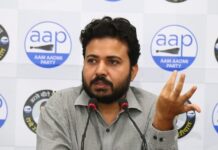
New Delhi, A day after he advocated India should hold talks with Taliban in Afghanistan, Army chief General Bipin Rawat on Thursday sought to justify his stand of not holding talks with “all stakeholders” in Kashmir, saying the situation in Afghanistan was different from that in the Valley.
He said that there cannot be a “one size fits all” approach and India will have to act as per its interests.
Replying to the general criticism of Army conducting operations in the Valley and applying too much pressure, the General emphasised that the Army was not out there “just to kill” but to bring peace.
He said that the mix of hard and soft approach of the Army was working well in Kashmir and a number of youth were returning to the mainstream, many of them quietly for fear of persecution from the “tanzeems” (organisations).
“Don’t look at one size fits all… There is also the sense that things have improved in Afghanistan. There the people’s voice is also emerging that they want peace. If India has interests in Afghanistan, it has to be on the table where other nations are talking to Taliban,” he said in response to a media query.
“But Jammu and Kashmir is a bilateral issue. There is no place for third party intervention. Here when we have to talk, we have to talk on our terms and conditions. Give up violence, stop taking support from the western neighbour, then who says that talks can’t take place.
“We are saying talks and terror cannot go together. And it is not only applicable to our western neighbour, it is also applicable to (the militants)… You can’t keep killing our security forces, keep abducting policemen and say we are ready for talks,” he added.
“Here, it is our people, our nation who are being swayed by our national adversary. It is high time they take a call. And not at the behest of someone who is forcing them into violence. Talks can only when happen they give up violence.
“Can somebody give us a guarantee that our convoys would not be attacked, our boys wont be abducted, attacked and people going on leave won’t be killed? If that kind of guarantee is given, we are willing to go into talks with them,” he said.
He said the youth were being radicalised on the social media to join terror ranks.
Asked for his views on IAS officer Shah Faesal, a Kashmiri doctor who topped the civil services in 2010, resigning from the service “to protest the killings in Kashmir”, the Army chief said: “If he has resigned to go to the youth and tell them that taking to the gun is not fine, then it’s a good thing.”
“Let’s see what he has resigned for. He has resigned because he feels that people are being killed or because a large number of people are taking to guns and then getting killed,” General Rawat added.
He said that Faesal needed to work on the society to tell them that they “should not fall for this false propaganda” and cite his own example of how he “became a Class I officer in this same state (India)” and that there is no discrimination.
In a social media post on Wednesday, Faesal had announced he was quitting the government service.
“To protest against the unabated killings in Kashmir and lack of any sincere reach-out from the Union government; the marginalization and invisiblisation of around 200 million Indian Muslims at the hands of Hindutva forces reducing them to second-class citizens; insidious attacks on the special identity of the J&K state and growing culture of intolerance and hate in the mainland India in the name of hyper-nationalism, I have decided to resign from IAS,” Shah Faesal had said.








